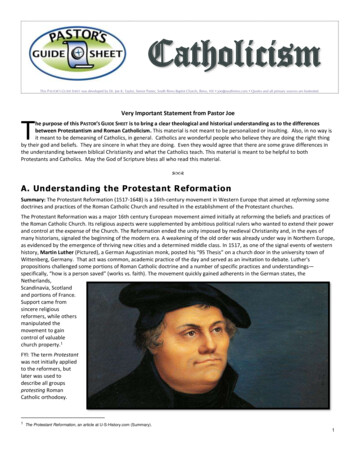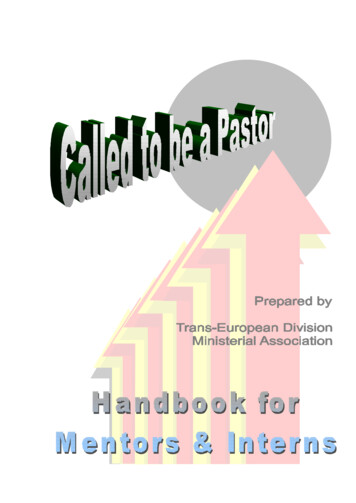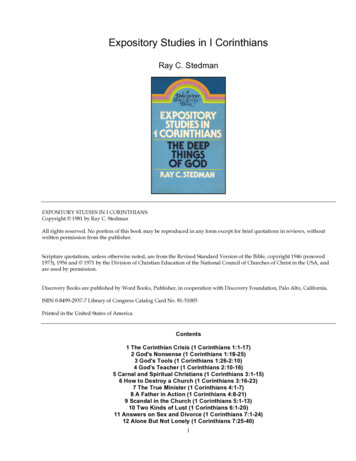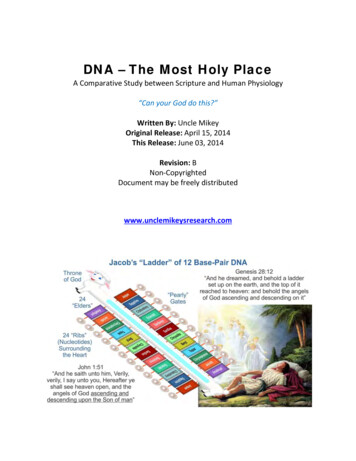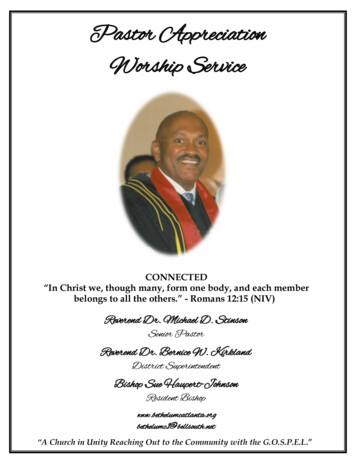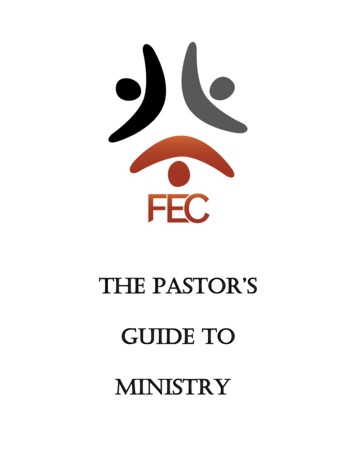
Transcription
The pasTor’sGuide TOMINISTRY
THE PASTOR'S GUIDE TO MINISTRYFECFellowship of Evanglelical Churches0
INTRODUCTIONThis handbook will be a valuable resource for each pastor, minister and credentialed worker.It addresses a variety of practical issues having to do with both the professional and thepersonal lives of those called to vocational Christian ministry.In this handbook the word "pastor" is used to refer to men who are ordained or who have aPastor's License. The word "minister" is used to refer to men or women who have aMinistry License. (Manual, pp. 41-45)The Pastor's Guide to Ministry has been written primarily for FEC pastors. However, itwill be valuable to all persons who hold a ministry or service license in FEC. In addition itwill be of value to many individuals serving in positions of lay leadership and ministry in acongregation.This publication constitutes Part One of the Guide to Ministry. Part Two, Helps for PastoralMinistry, to be published later, will be a looseleaf notebook with forms and other data forvarious ministry functions.All scripture references come from the NIV unless otherwise noted.When Manual is used, it refers to the FEC Manual of Faith, Practice and Organization.Preparation CommitteeAndrew M. Rupp, ChairmanDonald W. RothKent R. SmithD. Scott WagonerCharles L. ZimmermanJuly 19951
TABLE OF CONTENTSIntroduction . 1PART ONEGUIDE TO MINISTRYPrologue: As You Consider Your Call 5I. The Pastor and His Personal DevelopmentA. Devotional Life. . 6B. Character . 7C. Family . 8l. The Pastor and His Wife a. Physical .b. Spiritual .c. Intellectual .d. Emotional .2. The Pastor, His Wife, and Their Children .a. Maintaining a Consistent Christian Walk b. Taking Time with Their Children c. Leading Children in the Spiritual Disciplines .3. The Pastor and His Extended Family .88888999910D. Time Management 10l. Managing Time Between Personal and Professional Life . 102. Managing Time Within the Pastoral Role 11E. Finances .l. A Twofold Obligation to Provide .2. The Pastor's Obligation to Manage Well .a. The Tithe or Offering .b. The Payment of Debt .c. Insurance .d. Retirement Planning e. Savings f. Estate Planning .121212121313131314II. The Pastor and His RelationshipsA. Multiple Staff l. Ministerial Staff a. Senior Pastor Relating to Staff b. Staff Relating to Senior Pastor c. Interstaff Relationships . .2. Other Staff .a. Secretarial Staff b. Custodial Staff .1415151515161616B. Lay Leaders . 172
l. Communication . 172. Coordination 173. Accountability and Loyalty . 17C. Congregational .l. Visitation .a. Time is a Factor .b. The Occasions of Visitation c. A Teamwork Approach .18181819192. Friendships 20a. Every-Member Friendships . 20b. Personal Friendships 20c. Accountable Friendships . 20D. Community 21l. Local Religious Associations . 212. Civic Groups 213. Community-Wide Religious Services . 214. Community Meetings . 21E. FEC Denomination 22l. Convention . 222. Ministers and Wives Meetings 223. Boards and Committees . 22a. Boards . 22b. Committees 234. Promotion of Events, Needs and Ministries 235. FEC Ministers' Association 23III. The Pastor and the ChurchA. Administration of the Church . 23l. FEC Manual of Faith, Practice and Organization 232. Church Bylaws . 243. Church Boards . 244. Church Discipline . 245. Church Membership 24B. Services of the Church . 25l. Worship Services . 25a. Purpose and Philosophy of the Worship Service 25b. Planning the Worship Service . 26c. Participation of the Worshipers . 262. Other Regular Services 26a. Sunday School 27b. Sunday Evening or Afternoon 27c. Midweek . 27d. Other Regular Services . 273. Special Services . 27a. Weddings 27b. Funerals . 28c. Installations . 293
d. Dedications . 29C. Ordinances of the Church 30l. Believer's Baptism . 30a. Preparation . 30b. Baptismal Service . 302. The Lord's Supper 30D. Other Ministries of the Church 32l. Pastoral Counseling 32a. The Necessity of Pastoral Counseling . 32b. The Goal of Pastoral Counseling . 32c. The Resources of Pastoral Counseling . 32d. The Process of Pastoral Counseling . 32e. The Pitfalls in Pastoral Counseling 332. Anointing . 34a. Calling the Elders 34b. Confession of Sin . 34c. Anointing of Oil . 34d. Prayer of Faith 343. Small Groups 354. Recovery Groups . 355. Special Needs .a. Physical – Mental .b. Emotional – Relational .c. Financial – Legal d. Other .3636363737Epilogue: Before You Cancel Your Call . 374
PROLOGUEAS YOU CONSIDER YOUR CALLAll Christians are called by God to a life of discipleship and service to Christ. (Rom. 11:1-2).He, however, calls some to serve in roles of vocational Christian ministry. One of these roles ispastoral ministry.Throughout the Bible God called persons for specific roles of leadership in ministry. Examplesinclude Moses, Samuel, Isaiah, Jeremiah, the apostles (including Paul), Timothy and Titus.Passages such as Eph. 4:11-12 and 1 Tim. 3:1-7 clearly show the special role of vocationalChristian ministry.An examination of Scripture clearly reveals God's call upon the lives of these biblical examples.He continues to call people into roles of vocational ministry. Though today God's call is notnormally audible, there is still adequate basis by which the pastor can determine the veracity ofhis call.First, there is the inescapable conviction that God has his hand upon the one called to pastoralministry. The Apostle Paul expresses it this way: ".I am compelled to preach. Woe to me if Ido not preach the gospel!" (1 Cor. 9:16). The man who is called by God has an inner convictiongiven by the Holy Spirit. Second, the life of the one called to pastoral ministry must have thepersonal qualifications and gifts as listed in 1 Timothy 3. There ought to be ability and skill inthe work of shepherding. While every one called into pastoral ministry would acknowledge hisown personal inadequacy, he must be willing to declare with conviction, "Our competencecomes from God. He has made us competent as ministers of a new covenant" (2 Cor. 3:5-6).Third, the body of Christ should confirm what God has impressed upon the one he calls. As thebody enables its members to discover and exercise their spiritual gifts, the one called intovocational Christian ministry should be encouraged to cultivate and exercise his gifts under thecare of the local congregation. Then the body which has observed and assisted the one calledcan confirm the divine commission of God that says: "Set this one apart for the work to which Ihave called him" (Acts 13:2)The call to pastoral ministry is not merely an individual's choice in a smorgasbord of good thingsto do. God's call is born of the Holy Spirit's work in the believer's life and leads to theconviction that "This is the way, walk in it." (Isa. 30:21)5
I. THE PASTOR AND HIS PERSONAL DEVELOPMENTA. Devotional LifeThe devotional life of the pastor refers to the discipline of maintaining and developing one'srelationship with God. Though almost everyone would verbally express some commitmentto this discipline, it must not be assumed that all pastors would regularly experience it.Excuses and pressures that prevent this will have to be dealt with honestly. There is nosubstitute for this discipline in discharging all the duties of the pastoral ministry.One of the essential ingredients of a pastor's devotional life is involvement with God's Word.Though it is evident that reading and studying God's Word is necessary in preparation forpreaching and teaching, growth in one's relationship with God requires a more intimateencounter with His Word. Before one can do well at teaching and encouraging others, Paulexhorts, "Let the Word of Christ dwell in you richly" (Colossians 3:l6). For this to happen,there must be deliberate effort to let his word be at home in one's heart, implanted so deeplythat its truth has full impact upon every thought, plan and decision. The process begins withreading and studying God's Word with sufficient depth to understand what it means. This isfollowed with meditation in which a Scripture passage is thought through and digested inone's mind and heart until it becomes a natural pattern of thinking. This can be enhancedthrough memorization of Scripture, through music and singing the songs of our faith, andthrough reading Christian classics, biographies and devotional materials. The climax of theprocess is choosing to personalize the truth as an expression of one's love for the Lord and toapply it in a way that is visible in attitudes and actions. This practice is a giant step towardspiritual maturity and effectual ministry.A second ingredient of a pastor's devotional life is involvement in prayer. As God expresseshis heart to man through the Bible, so man expresses his heart to God through prayer. Prayeris the completion of the cycle of communication between God and man that keeps therelationship vital and growing.The Apostle Paul writes, "Pray continually" (1 Thessalonians 5:17). This implies that prayeris both an attitude and an activity. It requires the maintenance of a prayerful atmospheremoment by moment throughout the day as well as a daily program and period for prayer. Itscontent will include praise, confession, petition and intercession. The pastor in prayer shouldreflect the devotion of a son, the submission of a servant and the passion of an intercessor.It is clear that there is no substitute for the disciplines of daily time with God in his word andin prayer. This is the path the Master trod for strength and perspective. This is the pathwhich the pastor must take toward a sincere faith and a vital ministry. There are no shortcutshere. The demand for working on priorities and schedules remains constant. Even in this,the pastor does not work alone. The Lord is faithful to his servants, providing wisdom fromabove which enables the pastor to balance the ministry's demands while finding time forgrowth in spiritual strength and devotion.6
B. CharacterCharacter is the sum of a person's values, qualities and traits. It confers distinctiveness andserves as an index to that person's essential or intrinsic nature. A faulty inner heart may becovered for a time, but a faulty character cannot be hidden. It will cost the blessing of Godand limit the effectiveness of ministry. In addition, faulty character may disqualify one forthe pastoral vocation.A pastor must strive to develop and model a life of highest character. The Apostle Paul callsthis a "new life" (Romans 6:4), a "life worthy of the calling" (Ephesians 4:l), a "holy life" (2Timothy l:9), and a "godly life" (2 Timothy 3:l2). It is "new" because it is characterized byall the qualities that are antithetical to the old nature. It is "worthy of the calling" because itis consistent with the designed vocation. It is "holy" because it is set apart unto purity. It is"godly" in that it is genuinely Christlike.The pursuit of good character requires building from the inside out. It is God the Holy Spiritwho provides the inner potential and produces the spiritual fruit. This process requires livingin submission to the Holy Spirit, keeping in step with him, and being led by him (Galatians5:l8, 25). The delightful result of this is a distinctive character that manifests the beautifulqualities that please God and make a pastor fruitful in his work and witness (Galatians 5:22,23).Moving toward this goal will entail commitment and convictions. This commitment is to theLord and his word. Who he is and what he says must have priority over every other personor idea. Living with that commitment will build the intensity of inner conviction that holdsone steady in maintaining a noble character in times of discouragement, distractions, ortemptation.In view of Satan's pressure toward deceit, truthfulness in the inner man is indispensable.Honesty toward God, toward one's self and toward others is perhaps the most significantvirtue for character building and maintenance. Denial of feelings or thoughts or actions thatare not in harmony with God and his word will only perpetuate a life of hypocrisy andprevent the growth, the respect and the witness of a good character.To maintain this quality of integrity and the benefit of a good reputation, accountability is ofgreat importance. It is advisable for the pastor to seek out at least one other man with whomhe can be completely vulnerable concerning his inner feelings, various relationships, andministry activity. This practice will serve as a preventative to a downward slide in thoughtlife and to an eventual breakdown in morality and character.A ruined character cannot be restored easily or rapidly. It may also leave a lasting mark onthe lives of many others. Therefore, each pastor must take heed about what is happening onthe inside to avoid a breakdown in character and reputation that will cause the name of JesusChrist to be blasphemed, damage the witness of the church in its community and destroy avaluable, personal ministry planned by God.7
C. FamilyThe pastor must make every effort for him and his family to be an example to those he servesin his church, as well as those outside the church. In order for that to happen, the pastor whois married must consider his wife and children as critical and significant parts of his life andministry. Very few pastors neglect family and home by design. The pastor's family failswhen he neglects to work at and apply in his home and family some of the same managementand administrative skills necessary for work in the local church. The pastor must realize thatif he is failing at home with his wife and children, he has no right to be leading a localcongregation. For "if anyone does not know how to manage his own family, how can he takecare of God's church?" (1 Timothy 3:5). If there is failure in the home because of inadequateor poor management, in time there will be failures in the church.1. The Pastor and His WifeThe "one-flesh" relationship between the husband and wife is much more than physical; it isalso spiritual, intellectual, and emotional. That one-flesh relationship ought to be a growingexperience in all four of those areas. Because of society's moral ills and the unique hazardsof ministry, the pastor must take active steps to maintain and guard the strength and purity ofhis marriage. This can be accomplished by regularly evaluating the relationship in those fourareas:a. PhysicalA couple growing together in love ought to find that their sexual relationship is providingan increasing level of meaning and enjoyment. If there is dissatisfaction with the sexualrelationship in the marriage, there is the potential for finding sexual satisfaction outsideof the marriage.b. SpiritualSpiritual oneness is accomplished as the husband, who is both initiator and leader, shareswith his wife in the spiritual disciplines of prayer, Bible study, and worship on a regularbasis. As the spiritual disciplines are practiced together, the Spirit of God will uniteattitudes and goals because there has been a common sharing of the things of God.c. IntellectualIntellectual capacities and abilities vary with every person. But in order for the pastorand his wife to share a oneness in intellectual areas, they should participate in someactivities that will stretch and challenge both of them at the same time, e.g. the reading ofsome of the same books, taking a class together, etc.d. EmotionalEmotional oneness comes when two people deliberately share the same world of time,interests, feelings, thoughts, goals, and ideals. Undistracted periods of time spenttogether on a regular basis, perhaps alone and away from the routines of home and the8
church, are strongly recommended for the communication of experiences, dreams, fearsand secrets couples would tell no one else. Talking in private about these matters buildsemotional oneness as nothing else can.Few things are as important as the health of the pastor's marriage. While certain periods ofmarried life will produce greater levels of growth in different areas, growth in oneness insome areas ought to be occurring regularly. If not, the pastor must not allow the sin of prideto keep him from seeking counsel and help.2. The Pastor, His Wife, and Their ChildrenIn addition to the normal difficulties of growing up, there are other unique challenges facingthe pastor's children. This can make growing up as a pastor's child difficult. But difficultiescan be minimized if the pastor and his wife work diligently at the following:a. Maintaining a Consistent Christian WalkThe private behavior of the pastor and his wife in the home should not be markedlydifferent from their public image. When the public image is seriously out of line withtheir family life, they are bound to struggle and possibly fail with their children. Becausechildren are quick to spot hypocrisy in their parents, serious discrepancies between publicimage and private family life will often result in family breakdown. When this happens,children often rebel against the Lord and dishonor their parents. The pastor's childrenshould want to become Christians because of the consistent quality and character oftheir parents' lives, both in public and private.b. Taking Time with Their ChildrenEach child needs time alone on a regular basis with each parent. At times this may not beeasy to accomplish, but the pastor usually has the advantage of determining his ownschedule. Therefore, the pastor and his wife must make it a priority, on a consistentbasis, to plan for both scheduled and spontaneous times with their children. The children,though, must never see themselves as only an appointment on their parent's calendar.They should know that they have priority with and access to their parents at any time.c. Leading Their Children in the Spiritual DisciplinesAs the pastor has leadership responsibilities for the nurture and spiritual growth of hiscongregation, he must also take the leadership responsibility for the nurture and spiritualgrowth of their children. This means taking time with them for prayer, Bible study, andworship on a regular basis.A man's call to the gospel ministry of a local church may change, but the call to be a husbandand father does not. Therefore, he must maintain a constant vigil of sensitivity, discerningeven the subtle signs of need both in his wife and children. Someday the pastor will standbefore God, hoping to hear from him the words, "Well done, good and faithful servant"(Matthew 25:21). In order to hear those words, the pastor must have served faithfully both in9
his home and the church. But the pastor's first priority must be to serve faithfully the onesGod has placed closest to him--his wife and children.3. The Pastor and His Extended FamilyAny man is a son long before he becomes a husband or father. The quality of hisrelationships with his parents and siblings is a strong determinant in how well he functions asa husband and father in the family of his own making. The Bible instructs each person tokeep honoring one's parents. This means that a pastor will continue to develop a caringrelationship with each of his parents and will seek to be available to them in their times ofneed.Generally, a pastor will function better, both personally and professionally, if he is therecipient of his parents' blessing. It is important for each adult to have parental acceptanceand respect. In situations where this is lacking, the pastor is encouraged to be especiallyaware of God's acceptance and blessing.For the pastor, warm and caring sibling relationships serve as a good balance to relationshipswith people in the congregation where he is serving. The ongoing quality of relationshipswithin one's own extended family is important, too, in helping one to function well within thecontext of his extended family through marriage.D. Time ManagementIt should go without saying that when God calls a person into ministry, he does not extendthe length of the day in which the pastor must perform his duties. Because the pastor's timeis limited and his duties can seem unlimited, being a wise manager of time is of paramountimportance. Time management will help ensure the necessary balance between the demandsof personal and professional life and among duties within the pastoral role. How well aperson manages time within the pastoral role often determines the adequacy of time neededto conduct the affairs of personal life.l. Managing Time Between Personal and Professional LifeTime management often boils down to matching the allotment of time with the relativeimportance of each activity falling into the personal and professional realms of life. One'spersonal life necessarily includes family, leisure and non-church interests and pursuits.Professional life includes the various responsibilities which accompany administrating thechurch, sermon and lesson preparation, visitation, counseling, etc. The wise pastor paysclose attention to and controls this allotment of time and energy apportioned to personallife and professional life.It is good to establish an understanding with the employing church regarding the expectednumber of hours per week spent fulfilling the pastoral role. This provides a guideline bothfor the pastor and the church. Quantifying the approximate hours helps to maintain thepastor's integrity with his employing church and fulfills the church's need to reduce therisk of burnout and other problems which arise from "overworking." A general rule of10
thumb may be 45 hours plus the weekly number of hours spent by such persons asdeacons, elders, or teachers fulfilling their ministry in the church.There is a balance to this matter of keeping track of hours, however. The pastor is calledto faithfulness which demands hard work and hard work sometimes means long hours.Also, since there is no one who keeps track of the pastor's hours, there may be room (andtemptation) for slothfulness. Kent Hughes provides a helpful warning in his bookLiberating the Church from the Success Syndrome. Regarding the pastoral role, he says,"There are no clocks to punch or time cards to turn in. So if a man is not a self-starter, it isso easy to come in late and go home early. It is also very easy to let prayer and sermonpreparation slip, and generally, to imagine that extraneous interests are 'ministry.'"With that balance in mind, the importance of time off cannot be overlooked. Pastors whoshun the idea of time off may appear more dedicated to the task, but in the long run this iscostly to the church, the pastor and his family. A healthy family life necessitatesoncentrated time for "togetherness." A healthy marriage demands the same. In this casequality time is often quantity of time. The pastor who is concerned with buildingtogetherness must not ignore the value of both quality and quantity of time.Also, the pastor who neglects the pursuit of interests outside of "church" usually findshimself unfulfilled. Outside interests serve as bases for the formation and building ofrelationships. A parishioner appreciates a pastor who takes time off to become morewell-rounded and balanced in this way. The wise use of time off and the cultivation of themarriage and family relationships will reap long-lasting rewards for both the employingchurch and the pastor.2. Managing Time Within the Pastoral RoleAs stated above, time management has to do with the allotment of time based on priorities.Priorities are established in connection with assigned responsibilities for each pastor.Every pastorate demands a different mix with respect to time allotment for each aspect ofthe ministry. For example, when a church is made up of predominantly younger people,the pastor generally will give more time to counseling and less to hospital visitation. Alarger church with multiple staff will demand a senior pastor's time given to staffoversight. A smaller church may mean a pastor has little or no oversight responsibilitiesfor staff.Every pastor must give adequate time for the task of preparing to preach and teach theWord. This follows from Paul's exhortation to Timothy, the young pastor at Ephesus."Do your best to present yourself to God as one approved, a workman who does not needto be ashamed and who correctly handles the word of truth" (2 Timothy 2:l5).The Bible indicates that prayer holds an equally important priority for a pastor's ministry.This is asserted in the example of the Twelve in Acts 6:l-4 who appointed deacons inorder to "give attention to prayer and the ministry of the Word" (vs. 4).Worship planning, discipling, visitation, conference ministry--and the list of tasks which11
calls for the pastor's time goes on. Therefore, a basic understanding of priorities and adisciplined approach to time management are two indispensable tools for every pastor.E. Financesl. A Twofold Obligation to ProvideThere is a dual obligation for financial provision in the ministry. First, there is theobligation of the congregation to provide enough for the pastor to maintain a lifestylecommensurate with the lifestyle of the majority of those in the congregation and fittingwith the standard of the people living in the surrounding community. This seems to be inkeeping with the biblical teaching of l Timothy 5:l7-l8.The other obligation is that of the pastor for his family. l Timothy 5:8 says "If anyonedoes not provide for his relatives, and especially for his immediate family, he has deniedthe faith and is worse than an unbeliever." The pastor is not exempt from this mandate.It is incumbent upon the pastor to provide adequately in a material sense for his family.When this does not happen, tension mounts and the home life begins to adversely affecthis ministry.In some cases, where the church cannot provide adequately for the pastor, taking apart-time job may not be out of the question. Though circumstances will differ with eachpastor and within each church, a mutually beneficial arrangement usually can be arrived atwhich will keep finances from being a point of derision or bad will. In more "extreme"cases, a pastor may have to resign, take a secular job, and wait until God provides himwith a pastorate in a church that can meet the physical needs of his family. However, inall cases, the pastor must ensure that his decisions and actions do not dishonor the pastoraloffice and the ministry of the local church.Finally, pastors must remember that God's call is to ministry, not salary. The Scripturecalls every believer to contentment, not a seeking after more. Finally, a pastor's decisionsabout his ministry should finally maintain a proper balance of need, contentment, moneymanagement, and sacrifice for Christ.2. The Pastor's Obligation to Manage WellWhether or not a pastor and his family decide to live by a budget is optional. At the least,however, there must be a faithful managing of money which is entrusted to the pastor inthe sight of God. "Managing well" means covering certain financial bases, such as:a. The Tithe or OfferingThe pastor is called upon to lead his flock in everything. This includes leadership ingenerosity and giving. The regular setting aside of a (generous) portion of that whichGod has entrusted is a "non-negotiable" part of managing well.12
b. The Payment of DebtToday's economic climate makes it difficult to live virtually debt free all the time.Though that is a worthy goal for most, if not all pastors, how the pastor handles thedebt incurred is an even more important testimony to our ability to manage well. Thenone-use of credit for purchasing basic necessities seems most prudent. For somepurchases, credit card use is reasonable as a means of delaying payment for the shortterm. But debt which necessitates extended payments with accrued interest charges isan unwise use of money. In light of t
personal lives of those called to vocational Christian ministry. In this handbook the word "pastor" is used to refer to men who are ordained or who have a Pastor's License. The word "minister" is used to refer to men or women who have a Ministry License. (Manual, pp. 41-45) The Pastor's Guide to Ministry has been written primarily for FEC .



